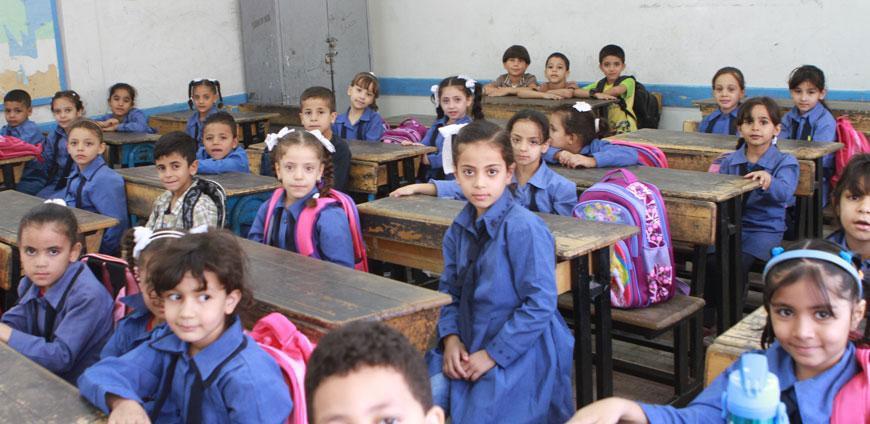You are here
Education in Middle East still lags despite ‘five decades of investments’
By Ana V. Ibáñez Prieto - Nov 15,2018 - Last updated at Nov 15,2018

A World Bank report says that there is a discrepancy in Jordan between education outputs and market needs (JT file photo)
AMMAN — Despite the region’s large investments in education, Arab youth are still not learning the skills they need to compete in the labour market, World Bank’s MENA Education flagship report said on Tuesday.
The report warned that the region’s educational flaws are contributing to one of the world’s highest rates of youth unemployment.
The report, titled “Expectations and Aspirations, A New Framework for Education in the Middle East and North Africa”, identified the problems holding back education in the region, and called for collective efforts to realise the potential of the regions young population.
Jordan’s educational mismatch with the labour market was pointed out earlier this year in a paper issued by the Jordan Labour Watch, which warned that while the number of graduates looking for jobs is increasing by 100,000 per year, the country continues to suffer from the “huge gap between the needs of the labour market and the skills that students are being taught in both higher education institutions and vocational training programmes”.
The Ministry of Higher Education recently attempted to address the issue through its admissions policy for the academic year of 2018-2019, which came in line with the objectives of the National Human Resources Development Strategy.
At the primary education level, the World Bank’s study pointed out that in Jordan, along with several other countries in the region, central authorities maintain strict control over curricular content and teaching practices, constraining the efforts by principals and teachers to be proactive in the learning process.
The report also criticised the practice of making 60 per cent of eighth grade students in Jordan memorise mathematics and science rules.
“Because of the emphasis on memorising rules, students are unable to show a basic understanding of everyday applications,” the study warned, noting that the practice “leaves little time for the development of critical thinking skills”.
However, the report commended Jordan on reducing the emphasis on examinations in lower grades, noting that “their high-stakes nature often results in teachers emphasising memorisation for examinations over problem-solving skills”.
Concerning children with disabilities, the study noted that Jordan was among the few Arab countries that had developed regulations and policies to create barrier-free, accessible environments for students with disabilities.
“However, inadequate school facilities and shortages of support personnel such as school psychologists, sign language interpreters, speech and language pathologists and physical and occupational therapists are still a challenge,” the report said.
In early childhood development, the study highlighted that “various interventions have proven to be effective and scalable in helping parents engage with their children and promote their development”, noting that Jordan’s Better Parenting project engaged parents and communities to raise awareness of better parenting.
At the regional level, the report lamented that “five decades of investments in education, impressive growth in enrolment rates and gender parity at almost all levels of education, have not been able to translate into increased human capital and wealth, failing to meet the aspirations of 435 million people in the region”.
In universities, the study said that “the large pool of unemployed graduates in the region was both a waste of valuable human capital and a clear sign of a disconnect between education systems and potential employers”, stressing that “this is especially true for young women, who outnumber men at universities but have double the unemployment rate of their male peers”.
Ferid Belhaj, World Bank vice president for the Middle East and North Africa (MENA), said that “what is now a source of frustration for the millions of unemployed graduates could become a launch pad for innovations that transform the region’s economies”, clarifying that “the goal is not to catch up with other education systems, but to leverage new technologies and the creativity of young people”.
The tension between credentials and skills, discipline and inquiry, control and autonomy and tradition and modernity were the four key elements holding back the region’s education according to the report, which mapped out a strategy to tackle the problem through a “concerted push for learning, a stronger pull for skills and a new pact for education among all national stakeholders”.
“Accumulating years of schooling is not enough — what matters is how much children are actually learning,” World Bank Senior Director for Education Jaime Saavedra stressed, warning that “having a credential or a certificate will be increasingly less valuable if it’s not accompanied by the skills young people need to be more productive”.
“But reforming the education system must be accompanied by other sectoral reforms,” the report said, noting that civil service reforms are necessary because teachers are selected and recruited through the civil service function of governments.
“Unleashing the potential of education requires a shift in mindset and tackling deeply held social norms, reforms that go beyond the education system, and alignment of interests among all stakeholders on a shared vision of the goals of education,” said Safaa El Tayeb El Kogali, World Bank MENA education practice manager and author of the new report.
Related Articles
AMMAN — The private sector can be an important driver for growth and rising prosperity in the Middle East and North Africa (MENA) region if
AMMAN — Luminus Education, a vocational and technical education provider, announced Tuesday in a press statement the launch of a regio
AMMAN — Without improved education and meaningful work opportunities in the Middle East and North Africa, the region faces a critical risk o


















